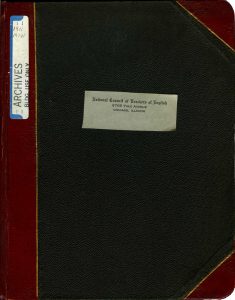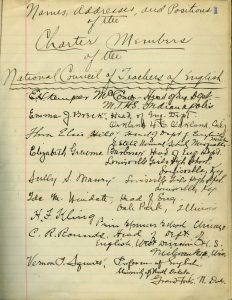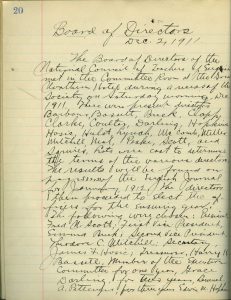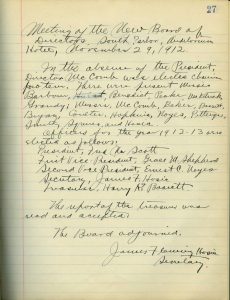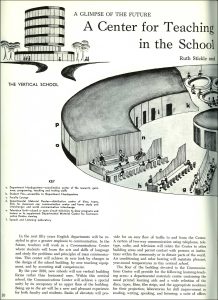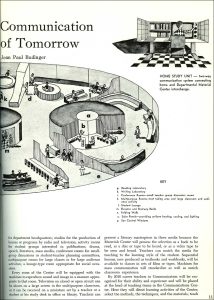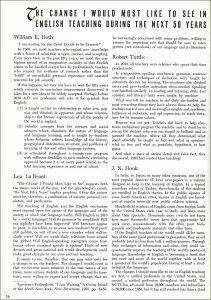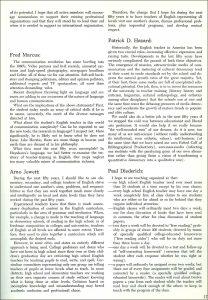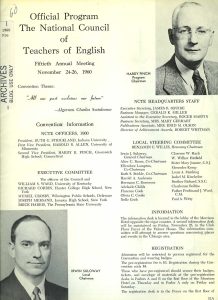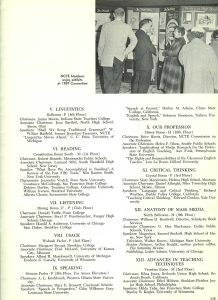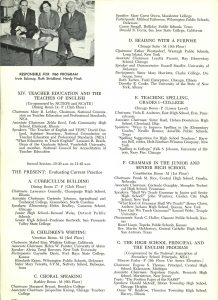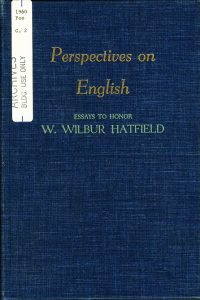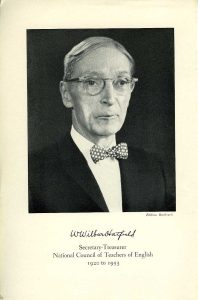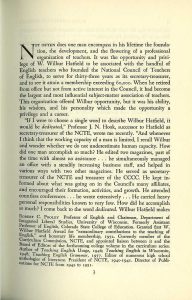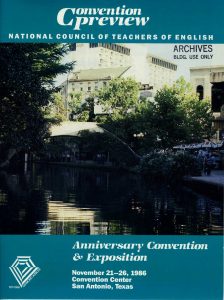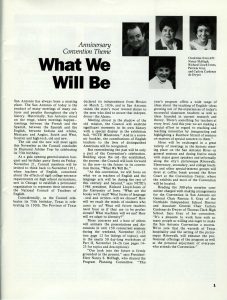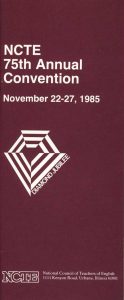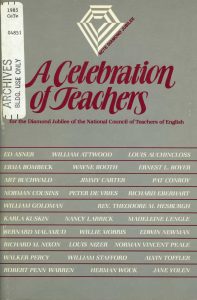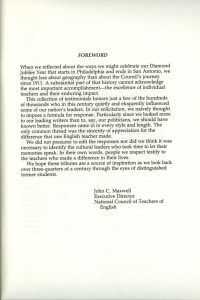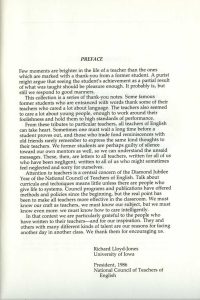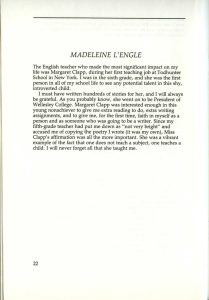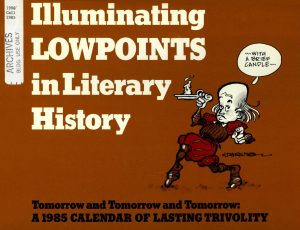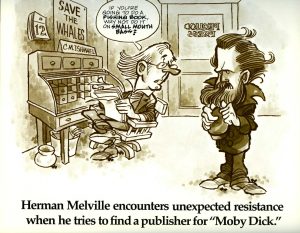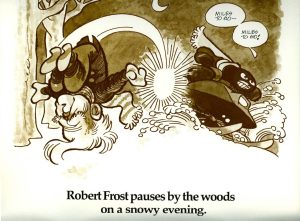“By the year 2010, new schools will use vertical building forms rather than horizontal ones…. Being up in the air will be a new and pleasant experience for both faculty and students. Banks of elevators will provide for an easy flow of traffic….Air conditioning and solar heating will maintain pleasant, year-round temperatures in this vertical school.”
Ruth Stickle and Jean Paul Budinger’s predictions in Golden Anniversary (1960)
NCTE’s first centennial has inspired reflection on its past, as well as concern on how to best preserve it for future retrospection. The Council has dedicated numerous projects to these ends, including the establishment of the Task Force on Council History; the transferring of records to the University of Illinois Archives for care and public access; the production of the documentary, NCTE Centennial Film: Reading the Past, Writing the Future, the publishing of the book, Reading the Past, Writing the Future: A Century of American Literacy Education and the National Council of Teachers of English; and the creation of the NCTE Centennial Celebration website that brings together and features the Council’s various projects to celebrate this historic event.
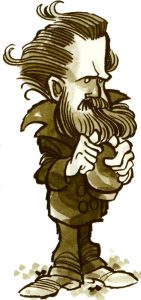 While this may be the organization’s first centennial, it is not the first time NCTE has celebrated an anniversary with a look at its past and predications for the future. The Council’s 50th and 75th anniversary also provided the occasion for considering the significance of not only the organization but also the profession. In particular, the 50th anniversary motivated Council members to ask how teaching English might change in another fifty years. What will the year 2010 be like? The 75th anniversary focused on honoring English teachers and their role in shaping society. How were today’s leaders influenced by past English teachers?
While this may be the organization’s first centennial, it is not the first time NCTE has celebrated an anniversary with a look at its past and predications for the future. The Council’s 50th and 75th anniversary also provided the occasion for considering the significance of not only the organization but also the profession. In particular, the 50th anniversary motivated Council members to ask how teaching English might change in another fifty years. What will the year 2010 be like? The 75th anniversary focused on honoring English teachers and their role in shaping society. How were today’s leaders influenced by past English teachers?
The themes for NCTE conventions celebrating these milestones all look forward: the 50th anniversary theme declared, “All our past acclaims our future”; the 75th theme wondered, “What We Will Be”; and the centennial focuses on action, “Reading the Past, Writing the Future.” Take a look at the featured topics below to learn more about how NCTE has celebrated its past: 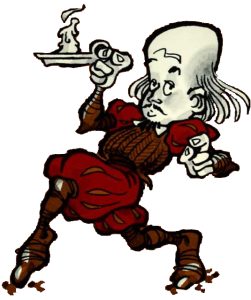
- The Founding Ledger
- Ledger of Member Signatures and 1911-12 Meeting Minutes
- Celebrating 50 Years: The Golden Anniversary
- Golden Anniversary
- Official Program for NCTE Annual Convention, 1960
- Perspectives on English: Essays to Honor W. Wilbur Hatfield
- Celebrating 75 Years: The Diamond Anniversary
-
- Convention Preview and Program
- Celebration of Teachers: For the Diamond Jubilee of the National Council of Teachers of English
- NCTE Calendar, “Illuminating Lowpoints in Literary History”
-
Ledger of Member Signatures and 1911-12 Meeting Minutes
NCTE was founded in the winter of 1911 by a group of English teachers attending a two-day national organizational meeting at the Great Northern Hotel in Chicago. The meeting, led by James F. Hosic, was in response to rigid college entrance requirements and their effects on high school English curriculum. The names of 35 of those attendees can be found in Hosic’s ledger, which they signed to become charter members of NCTE. In A Long Way Together: A Personal View of NCTE’s First Sixty-Seven Years, J.N. Hook described the Council as “an organization born out of protest but inspired by altruistic urges” (1979, p. 3). Hosic also recorded the minutes of NCTE’s meetings in 1911-12, including the first annual meeting and the first Board of Directors meeting. Learn more: 15/70/003
Item: Ledger (1911)
Golden Anniversary
To celebrate its 50th anniversary, the NCTE published Golden Anniversary in 1960. Full of reflections and predictions from NCTE members, this monograph offered a thorough examination of the organization and profession and their roles. Two articles, “The Change I Would Most Like to See in English Teaching During the Next 50 Years” and “A Center for Teaching Communication in the School of Tomorrow,” focused on what English teaching will be like in the year 2010. Contributors offered a hopeful view of the future, one where many of NCTE’s goals, such as smaller class sizes, have been realized. Learn more: 15/71/824
Item: Copy of Golden Anniversary (1960)
1960 NCTE Annual Convention
From its official program in 1960, it was clear that NCTE’s 50th anniversary influenced the sessions and workshops, encouraging retrospection. Sessions such as “What Have We Accomplished in Reading? — A Review of the Past Fifty Years” and “Shall We Scrap Traditional Grammar?” reinforced NCTE’s tendency to both reflect on the past and decide what changes may be in store for the future. The program also contained images of NCTE members and staff, including the organizers of the 1960 program: Irwin Suloway, Ruth Strickland, and Hardy Finch. Learn more: 15/71/824
Item: Copy of Official Program: The National Council of Teachers of English (1960)
Perspectives on English: Essays to Honor W. Wilbur Hatfield
It was also during the time of the 50th anniversary that NCTE honored one of its earliest members, W. Wilbur Hatfield. To recognize Hatfield and his extensive contributions to NCTE, the Council published Perspectives on English: Essays to Honor W. Wilbur Hatfield in 1960. In the introduction, the editor quoted J.N. Hook’s praise for Hatfield in a letter sent to the editor: “If I were to choose a single word to describe Wilbur Hatfield, it would be dedicated. And whenever I think that the working capacity of a man is limited, I recall Wilbur and wonder whether we do not underestimate human capacity.” Hook then went on to list the many accomplishments of Hatfield, including being secretary treasurer of NCTE and treasurer of CCCC, editing two magazines, writing countless articles, attending national conferences regularly, and managing the business office. Learn more: 15/71/824
Item: Perspectives on English: Essays to Honor W. Wilbur Hatfield (1960)
The Diamond Jubilee Convention
The next significant anniversary that NCTE recognized was its 75th year. The Diamond Jubilee Convention Preview detailed the events planned to celebrate this occasion: “The Council will enshrine significant moments in its history with a special display in the exhibition hall, ‘NCTE Milestones.'” However, NCTE’s theme, “What We Will Be,” was future-oriented. The Preview explained the reasoning behind selecting this slogan: “Remembering the past will only be a part of the Convention’s celebration. Building upon the old — the established, the proven — the Council will look forward to the new — to the future.” NCTE celebrated its Diamond Jubilee at both its 1985 and 1986 convention. Learn more: 15/74/10
Item: Copy of Diamond Jubilee Convention Preview and Program (1986)
A Celebration of Teachers
As a special way to mark its 75th anniversary, NCTE published A Celebration of Teachers: For the Diamond Jubilee of the National Council of Teachers of English. This book is a collection of testimonials from famous leaders and writers. The Council asked for stories on how an English teacher influenced them for the better. Madeleine L’Engle was one such contributor, thanking her sixth grade teacher, Margaret Clapp. She wrote: “She was the first person in all my school life to see any potential in this shy, introverted child….She was a vibrant example of the fact that one does not teach a subject, one teaches a child.” Other contributors included Margaret Walker Alexander, Jimmy Carter, and Richard Nixon. Learn more: 15/71/824
Item: Copy of A Celebration of Teachers: For the Diamond Jubilee of the National Council of Teachers of English (1985)
NCTE Calendar
Coinciding around the time of NCTE’s Diamond Jubilee, the Council released the calendar, “Illuminating Lowpoints in Literary History.” Drawn by Robert C. Harvey and “aided and abetted by fellow NCTE staff members Mark Anderson, Robert Hogan, and Paul O’Dea,” this calendar lampooned legendary writers and poets, including William Shakespeare, Herman Melville, and Robert Frost. Learn more: 15/71/824
Item: NCTE Calendar, “Illuminating Lowpoints in Literary History” (1985)
